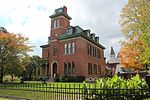Robert F. Kennedy's speech on the assassination of Martin Luther King Jr.
On April 4, 1968, United States Senator Robert F. Kennedy of New York delivered an improvised speech several hours after the assassination of Martin Luther King Jr. Kennedy, who was campaigning to earn the Democratic Party's presidential nomination, made his remarks while in Indianapolis, Indiana, after speaking at two Indiana universities earlier in the day. Before boarding a plane to attend campaign rallies in Indianapolis, he learned that King had been shot in Memphis, Tennessee. Upon arrival, Kennedy was informed that King had died. His own brother, John Fitzgerald Kennedy had been assassinated on November 22, 1963. Robert F. Kennedy would be also assassinated two months after this speech, while campaigning for presidential nomination at the Ambassador Hotel in Los Angeles, California. Despite fears of riots and concerns for his safety, Kennedy went ahead with plans to attend a rally at 17th and Broadway in the heart of Indianapolis's African-American ghetto. That evening he addressed the crowd, many of whom had not heard about King's assassination. Instead of the rousing campaign speech they expected, Kennedy offered brief, impassioned remarks for peace that are considered to be one of the great public addresses of the modern era.
Excerpt from the Wikipedia article Robert F. Kennedy's speech on the assassination of Martin Luther King Jr. (License: CC BY-SA 3.0, Authors).Robert F. Kennedy's speech on the assassination of Martin Luther King Jr.
Broadway Street, Indianapolis
Geographical coordinates (GPS) Address Nearby Places Show on map
Geographical coordinates (GPS)
| Latitude | Longitude |
|---|---|
| N 39.790833333333 ° | E -86.146388888889 ° |
Address
Landmark for Peace Memorial
Broadway Street
46202 Indianapolis
Indiana, United States
Open on Google Maps






